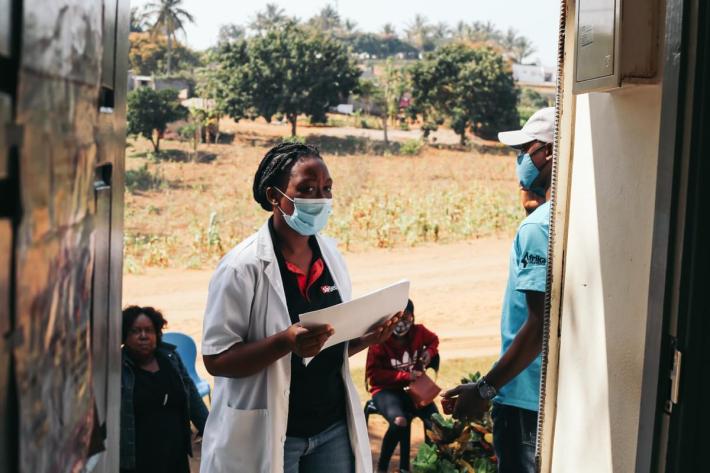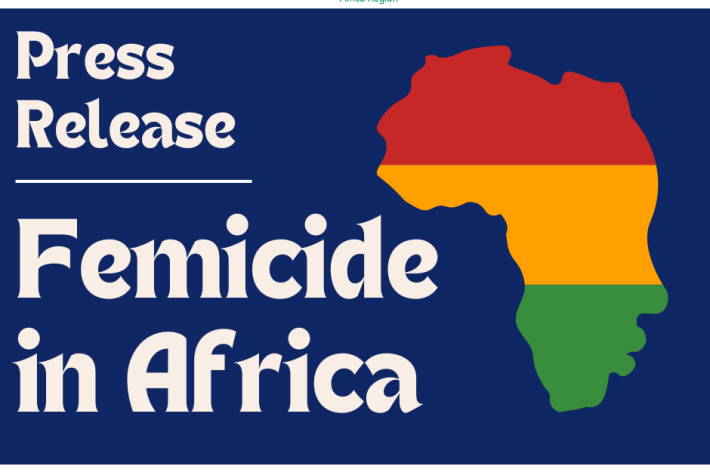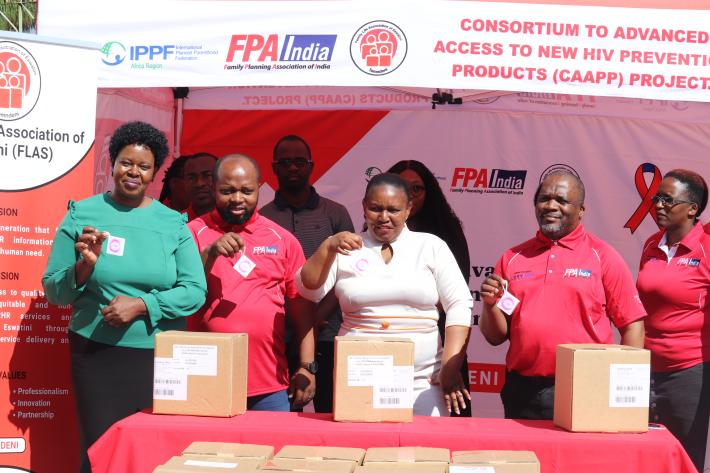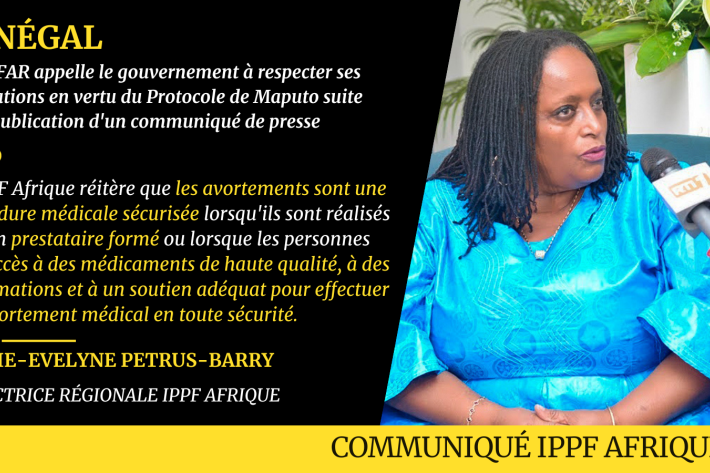Latest press releases
A selection of stories from across the Federation
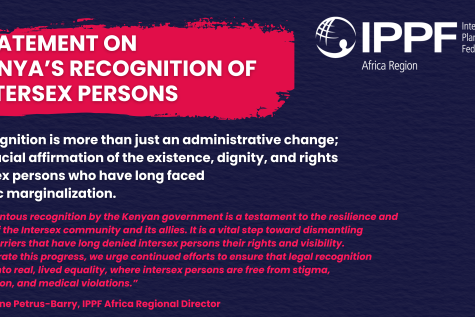
Kenya
IPPF Africa Region Welcomes Kenya’s Landmark Recognition of Intersex Persons
IPPF Africa Region Welcomes Kenya’s Landmark Recognition of Intersex Persons Nairobi, Kenya: 13 February 2025 – On 31 January 2025, Kenya has taken a groundbreaking step towards inclusivity and human rights by officially recognizing intersex as a sex marker alongside male and female in the Kenya Legal Notice 153 of 2025.

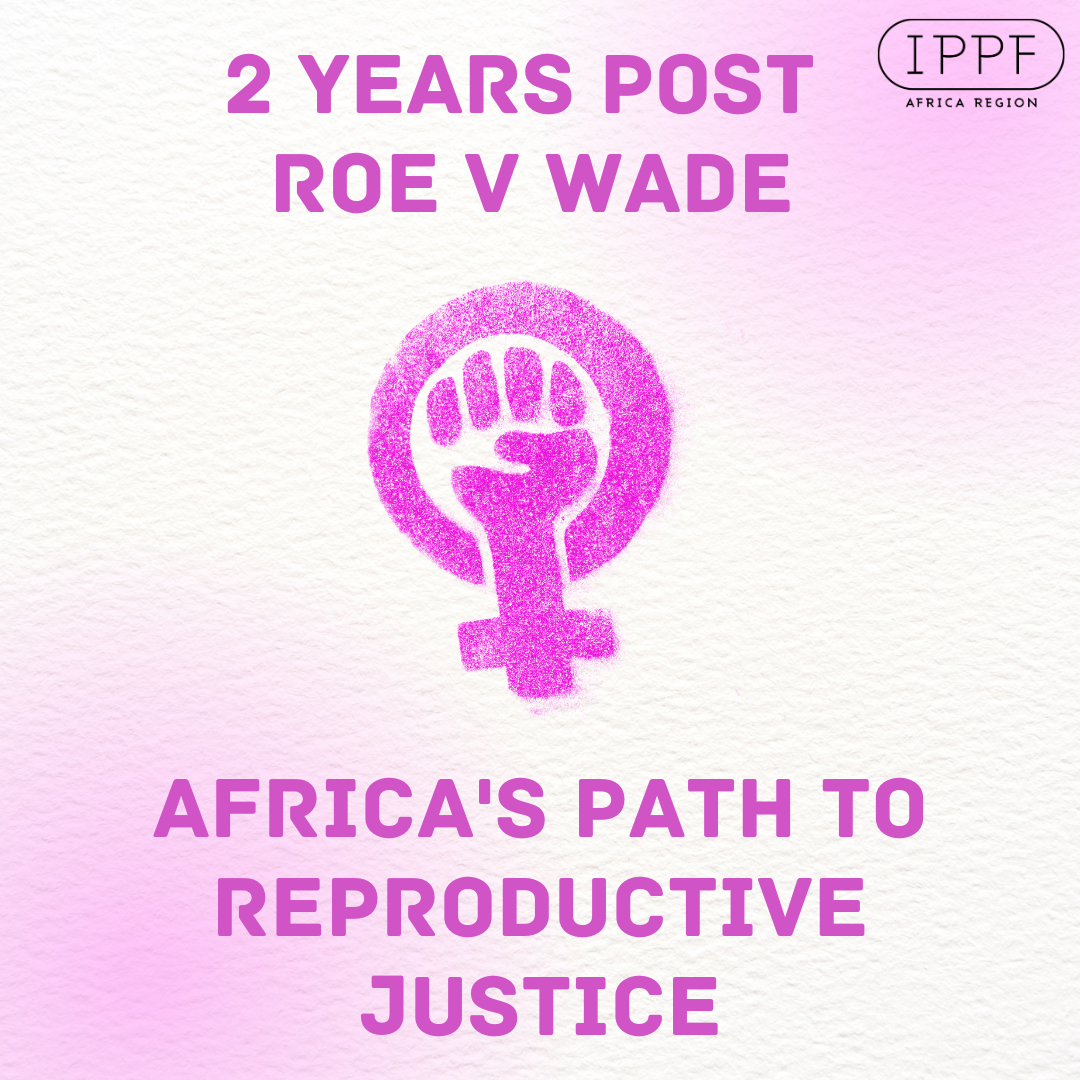
| 24 June 2024
Two Years Post-Roe: Africa's Path to Reproductive Justice
By Marie-Evelyne Petrus-Barry and Mallah Tabot June 24th this year marks the second anniversary of the repeal of Roe v. Wade, a seismic shift in the landscape of reproductive rights that has reverberated far beyond the borders of the United States. In June 2022, the US Supreme Court overturned the landmark 1973 ruling which had established a woman's legal right under the US Constitution to have an abortion. This repeal has had global repercussions, further emboldening anti-abortion movements, and influencing reproductive rights debates, policies, funding, and services. In Africa, not only did it send shockwaves, but has also prompted a reflection and re-evaluation of our role as African stakeholders in shaping the future of reproductive rights everywhere on the continent. In many countries on the continent where access to abortion care is already fraught with challenges, this development serves as a stark reminder of the fragility of reproductive rights. It highlights the danger of complacency and the need for vigilance in protecting and advancing these rights and reminds us that abortion is not a moral issue for debate, it is healthcare, and a fundamental human right. While the repeal has sparked renewed activism and advocacy for rights actors on the continent, it has also further emboldened conservative factions and a growing anti-rights movement to push for more restrictive laws and policies through novel tactics to further their agenda. Under the guise of protecting the family, anti-abortion narratives are used as entry points to infiltrate political, legislative and advocacy spaces to roll back hard-won gains. Even going as far as setting up alternative research institutions in Africa to generate quasi-scientific evidence to counter reputed research bodies like the Guttmacher Institute. Increasingly, a key tactic is the weaponizing of First Ladies to further the anti-rights agenda. In Kenya, the National Family Protection Policy, drafted by a major anti-rights group, Citizen Go was launched by the First Lady, despite not undergoing public participation and receiving lots of criticism from rights actors. In Uganda, the Geneva Consensus declaration, an anti-abortion joint statement is making inroads in the country through its affiliation with the First Lady, even though the “Consensus” has no legal or policy underpinning. This trajectory underscores a critical reality: Nothing is safe, our continent is a battleground for the ideological struggles taking place elsewhere in the world, sadly, our human rights, including SRHR are at the highest risk. We must forge our own path, grounded in the unique political contexts of our nations through our partnerships with local organizations and governments. As one of the leading voices on SRHR advocacy and services in Africa, IPPF believes now is the time for Africa to assert its leadership in the global fight for reproductive justice. In collaboration with other key actors on the continent and beyond, IPPF is committed to continue playing a pivotal role in the SRHR landscape of Africa. We will continue to expand access to abortion care, especially for the most vulnerable and marginalized, comprehensive sexuality education, contraceptive services and reaching those in humanitarian settings. Despite these efforts, much work remains. The disparities in access and the entrenched stigma surrounding abortion care continue to hinder our progress. One of the key initiatives we are proud to be part of is the CATALYSTS Consortium, which was born out of this landmark ruling in June 2022. Following the ruling, IPPF Africa Region, Ipas Africa Alliance, Centre for Reproductive Rights Africa, Population Council Kenya and FIGO came together to discuss the ruling’s implications on the continent and consider the case for an abortion consortium that might more effectively protect and promote abortion rights in Africa. Launching on June 27th, the Consortium has set an ambitious and unambiguously comprehensive vision for abortion care for all in Africa. This type of organic consortium on abortion has not yet been attempted. As African thought leaders, field builders and a vehicle for driving accountability, we are a Consortium of the brave with a track record of never backtracking. Our solution is powerful, impactful, and led by those doing the work while building an African critical mass that can effectively open doors, advocate more strongly and underpin bolder action. CATALYSTS is Africa-led, committed to decolonizing, and reframing the discourse around abortion rights in Africa by centring African perspectives, experiences, and voices. But we cannot achieve our goals in isolation. It is imperative that African governments, activists, youth groups and other civil society groups recognize the urgency of prioritizing reproductive rights. Governments must decriminalize abortion, ensure access to contraceptives, and protect the rights of individuals to make informed choices about their reproductive health and rights. Cross-border activist solidarity is imperative if we must move the needle on reproductive justice, and young people should be recognized as not just a passive group with SRHR needs but as critical actors at the centre of the journey towards reproductive justice. IPPF ARO stands ready to champion this charge, but we need the support and collaboration of governments, communities, and international partners. CATALYSTS launches on June 27th after close to two years of consultation, course correction, investment, and realignment. I invite you to join us in bringing this vision to life, which will be marked by the unveiling of the website, Theory of Change, and call to action. It promises to be a celebration of our collective achievements and a testament to the transformative power of collaboration. As we mark the second anniversary of the Roe v. Wade repeal, the stakes could not be higher for African SRHR actors. The urgent need for a unified and proactive approach to safeguard and advance reproductive rights on the continent is imperative as the path forward requires bold action, unwavering commitment, and a collective direction. For us, the lesson is clear: They are coming for us, bolder, stronger, and more organized, and we cannot depend on the legal frameworks or political will of foreign nations to safeguard our reproductive rights. Instead, we must strike back and reclaim our narrative, and enforce our own robust policies that reflect the needs and realities of our people.

| 21 June 2024
IPPFAR Statement on the Historic Ruling of the Namibian High Court
June 21, 2024, Nairobi, Kenya - History was made today as the High Court of Namibia declared the apartheid-era sodomy law unconstitutional. The ruling also struck down all references to sodomy in other laws, including the Criminal Procedure Act, the Defense Act, and the Immigration Control Act. This monumental decision represents a significant step towards achieving a free and equal Namibia, creating a unified safe space for the LGBTQI+ community. It marks the beginning of ensuring rights, respect, and dignity for LGBTQI+ persons in the country. Namibia has a long-standing history of LGBTQI+ activism, highlighted by several landmark court cases. This latest ruling in the Friedel Dausab case, which challenged the constitutionality of the sodomy law is a testament to the relentless efforts of activists and allies who have worked tirelessly to secure equality and justice for all. The now repealed law is a relic of the colonial era, however in many countries across Africa such laws have continued to be used to target marginalised and vulnerable groups long into independence. Therefore, this ruling is both a win for the rights of LGBTQI+ persons, and the continued struggle for Africa’s independence. “We recognize the deeply entrenched impact of colonialism on the sexuality of Africans, and this court ruling is a testament not just to this win but also to breaking free from discriminatory colonial imprints within the African region. It symbolizes the collapse of a long history of colonial oppression and the restoration of dignity, pride, autonomy, and freedom for LGBTQI+ Namibians and Africans at large”. Marie-Evelyne Petrus-Barry, IPPF Regional Director, Africa Omar van Reenen, a Namibian civil rights activist and Executive Director of Equal Namibia, made a statement right after the court's declaration: "A new dawn is upon us, and equality and liberation are here. After 33 years of independence, queer people have been shackled by the colonial and apartheid-era law. The High Court today has given us a beacon of hope by declaring that these outdated laws have no place in a free Namibia. They have affirmed that we are equal citizens with every right and liberty enshrined in the constitution." The International Planned Parenthood Federation Africa Region is celebrating alongside activists, allies, and the entire LGBTQI+ community in Namibia. This victory signifies hope and the possibilities of freedom rippling through the African continent.

| 03 April 2024
IPPFAR is alarmed by Uganda’s ruling upholding draconian Anti-Homosexuality Act 2023
Nairobi, Kenya: 3 April 2024 – The International Planned Parenthood Federation Africa Region (IPPFAR) is appalled by the ruling to uphold Uganda’s Anti-Homosexuality Act 2023. This regressive law violates human rights including sexual and reproductive rights, impacting not only the LGBTIQ+ community but all Ugandans. IPPFAR is deeply concerned by the Constitutional Court’s statement following the ruling, which implies a conflict between universal human rights on the one hand, and the diversity of cultures on the other. This is a dangerous path. The foundational tenet of human rights is that they are applicable to all simply because we exist as human beings, regardless of any other status. This must be defended at all costs. "We wholeheartedly condemn the decision to uphold this abhorrent law. IPPFAR reiterates that Human Rights are universal, indivisible and inalienable. We stand in solidarity with those who continue to fight against the injustices inflicted by this law on Ugandans", stated Marie-Evelyne Petrus-Barry, IPPF Africa Regional Director. IPPFAR also notes with alarm the framing of the rights of LGBTIQ+ people in Uganda as conflicting with broader communal or societal rights. This is a continuation of the ‘othering’ of members of the community and contributes to their exclusion, discrimination, and precarious safety situation. Local Ugandan civil society organizations have documented a significant increase in arrests, physical assaults against the LGBTIQ+ community, threats to the safety of civil society organizations, and a distressing rise in hate speech targeting LGBTIQ+ individuals and their allies since the law was enacted. "As the foremost provider of sexual and reproductive health (SRH) services in Africa, we are deeply concerned that this law will have a harmful impact on our delivery of vital SRH services in the country due to the fear of individuals seeking healthcare, including HIV treatment, being targeted, persecuted, or discriminated against", added Marie-Evelyne Petrus-Barry. This devastating decision is a setback and is a call to action to resist increasing human rights violations in Uganda and across the continent. IPPFAR continues to be concerned about similar attempts to pass anti-LGBTIQ+ legislation in other African countries, as part of a growing effort to curtail SRHR and human rights more broadly. “We must continue to push back against efforts to roll back the human rights of Africans and uphold the full enjoyment and protection of sexual and reproductive health, rights, and justice for all, regardless of their background, circumstances, sexual orientation, or gender identity”, said Marie-Evelyne Petrus-Barry. IPPFAR will continue to staunchly advocate for the sexual and reproductive health rights of all and against regressive laws and actions that limit people’s human rights and freedoms. The International Planned Parenthood Federation is inspired by the strength and courage of human rights defenders, advocates, and activists in Uganda who continue to fight against the Anti-Homosexuality Act despite the real dangers they face. They have led the fight, and this is our collective continued struggle. We call on all stakeholders to support local activists as they are often at the forefront in the effort for the realization of human rights for all, including SRHR. IPPFAR stands in unwavering solidarity with the LGBTIQ+ community, wherever they may be. END For more on IPPFAR's statements on the Anti-Homosexuality Act in Uganda: 23 March 2023 Uganda: IPPF Africa Region strongly urges the government not to enact the new harmful anti – LGBTIQ+ law 10 May 2023 Uganda: IPPF Africa Region Urges President Museveni to Veto Harmful New Anti-Rights Law Targeting LGBTIQ+ Community 30 May 2023 IPPF Africa Condemns Uganda's Anti-Homosexuality Act as a Violation of Human Rights And Sexual And Reproductive Rights For further information or to request an interview, please contact: -Mahmoud GARGA, Lead Strategic Communication, Voice and Media, IPPF Africa Regional Office (IPPFAR) – email: [email protected] / Tel: +254 704 626 920 ABOUT IPPF AFRICA REGION (IPPFAR) The International Planned Parenthood Federation Africa Region (IPPFAR) is one of the leading sexual and reproductive health (SRH) service delivery organization in Africa, and a leading sexual and reproductive health and rights (SRHR) advocacy voice in the region. Headquartered in Nairobi, Kenya, the overarching goal of IPPFAR is to increase access to SRHR services to the most vulnerable youth, men and women in sub-Saharan Africa. Supported by thousands of volunteers, IPPFAR tackles the continent’s growing SRHR challenges through a network of Member Associations (MAs) in 40 countries. We do this by developing our MAs into efficient entities with the capacity to deliver and sustain high quality, youth focused and gender sensitive services. We work with Governments, the African Union, Regional Economic Commissions, the Pan-African Parliament, United Nations bodies among others to expand political and financial commitments to sexual and reproductive health and rights in Africa. Learn more about us on our website. Follow us on Facebook, Twitter, Instagram and YouTube.
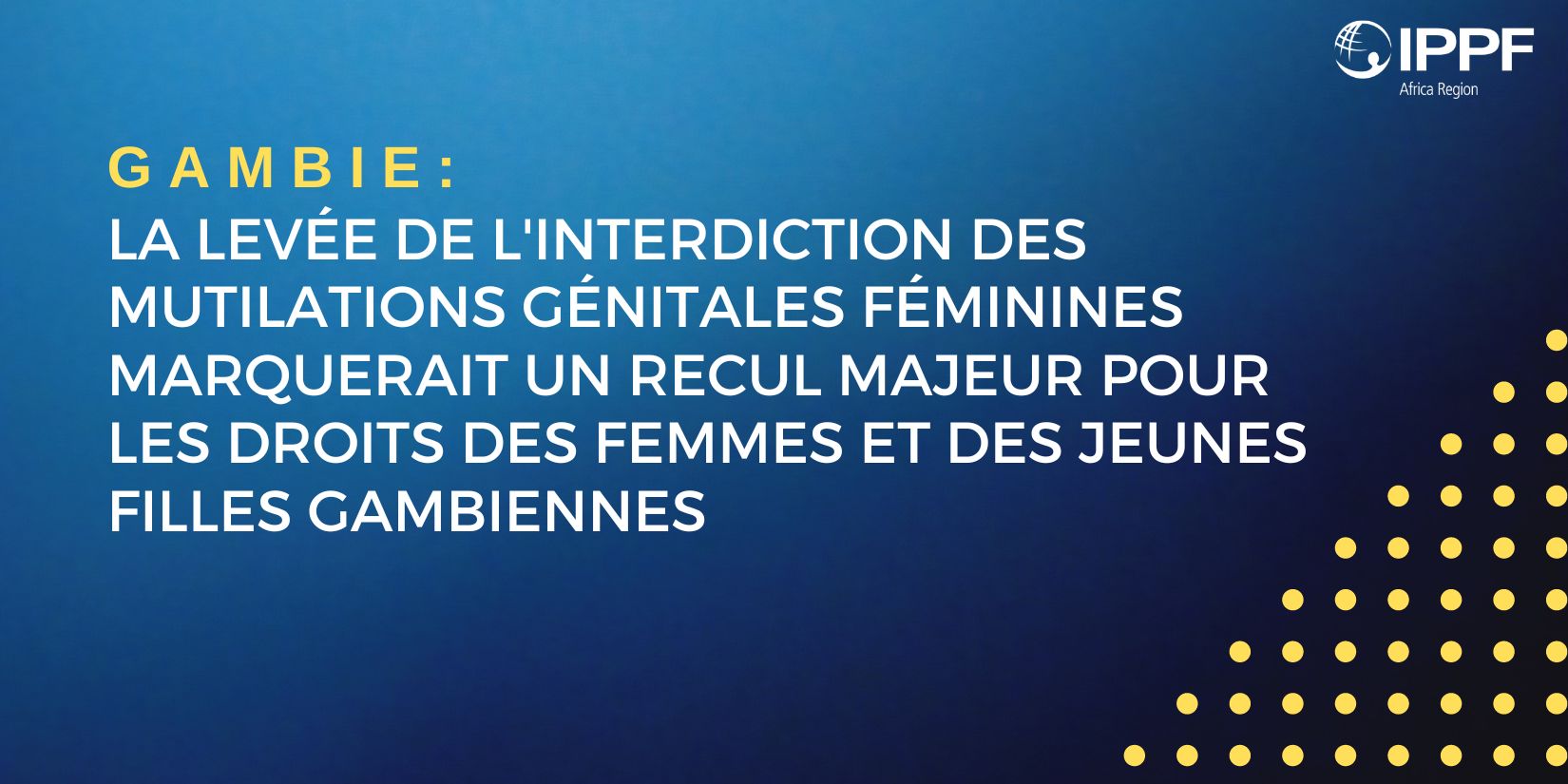
| 26 March 2024
The Gambia: Reversal Of The FGM/C Law Would Be A Major Setback For The Human Rights Of Gambian Women And Girls
Nairobi, Kenya: 26 March 2024 – The International Planned Parenthood Federation Africa Region (IPPFAR) is deeply concerned by the proposal to reverse the ban on Female Genital Mutilation/Cutting (FGM/C) in The Gambia. Lawmakers in the country have voted 42 to four to send the bill to a parliamentary committee for review. Joining the voices of survivors and activists, IPPFAR urges the government to not repeal the law and uphold the rights of women and girls in The Gambia. The purposed bill to lift the ban of FGM/C in The Gambia is a regressive step that threatens to jeopardize the progress made in safeguarding the rights and health of women and girls. FGM/C is a violation of human rights and poses serious health risks. Women and girls are subjected to FGM/C in at least 30 countries in Africa. Many reasons are given for this abuse including religious, sexual, cleanliness and health. However, these have been dispelled. FGM/C is not a religious obligation in any religion, it does not increase cleanliness, and has absolutely no health benefits. In reality, FGM/C is underscored and fuelled by harmful gender and social norms and is yet another way that patriarchal systems try to control bodies and sexuality of women and girls. FGM/C affects women and girls thought their entire lives, impacting both mental and physical health and is unequivocally a gross violation of several human rights including; Equality and non-discrimination on the basis of sex, Freedom from torture and cruel, inhuman or degrading treatment, The Right to highest attainable standard of health, The Right to physical integrity, The Rights of the child, The Right to life. “At a time when countries are working to end FGM/C for good and protect the rights of women and girls, it is incredibly disappointing that The Gambia is going against this trend and put the lives of young girls and women at risk. We urge the government of the Gambia to join the growing number of countries that are working to eliminate this human rights abuse for good,” said Marie-Evelyne Petrus-Barry, Regional Director, IPPF Africa Region. The detrimental impacts of the tabling of the bill are already evident across The Gambia. As highlighted by Human Rights Activist and FGM/C survivor Fatou Darboe, the tabling of the pro-FGM/C bill undermines the crucial protections afforded to women and girls in the country. This erosion of protection is exemplified by the observations of activist Haddy Jonga, who rightfully expressed concerns that without stringent enforcement, women and girls remain at risk of undergoing FGM/C. “FGM/C affects the entire life of a survivor. Those who have been subjected to FGM/C are more likely to drop out of school early, be subjected to early, forced or child marriage, and become pregnant as adolescents. Eliminating the practice increases the chances of a girl finishing school, and contributing towards better health and life outcomes,” added Fadoua Bakhadda, Regional Director, IPPF Arab World Region. IPPFAR urges the Gambian government to keep the anti-FGM/C law in place. Maintaining the legal framework against FGM/C is imperative to protecting the well-being and bodily autonomy of Gambian women and girls. Anti-FGM/C activists in the country – largely led by survivors – are being attacked and threatened for their efforts to defend human rights. Furthermore, the proposal to reverse the law has emboldened FGM/C practitioners, risking the lives of women and girls. We urge the government to prioritize the enforcement of the existing Anti-FGM/C law and to ensure the continued advancement of women's rights and the promotion of gender equality in The Gambia. END For further information or to request an interview, please contact: -Mahmoud GARGA, Lead Strategic Communication, Voice and Media, IPPF Africa Regional Office (IPPFAR) – email: [email protected] / Tel: +254 704 626 920 ABOUT IPPF AFRICA REGION (IPPFAR) The International Planned Parenthood Federation Africa Region (IPPFAR) is one of the leading sexual and reproductive health (SRH) service delivery organization in Africa, and a leading sexual and reproductive health and rights (SRHR) advocacy voice in the region. Headquartered in Nairobi, Kenya, the overarching goal of IPPFAR is to increase access to SRHR services to the most vulnerable youth, men and women in sub-Saharan Africa. Supported by thousands of volunteers, IPPFAR tackles the continent’s growing SRHR challenges through a network of Member Associations (MAs) in 40 countries. We do this by developing our MAs into efficient entities with the capacity to deliver and sustain high quality, youth focused and gender sensitive services. We work with Governments, the African Union, Regional Economic Commissions, the Pan-African Parliament, United Nations bodies among others to expand political and financial commitments to sexual and reproductive health and rights in Africa. Learn more about us on our website. Follow us on Facebook, Twitter, Instagram and YouTube.
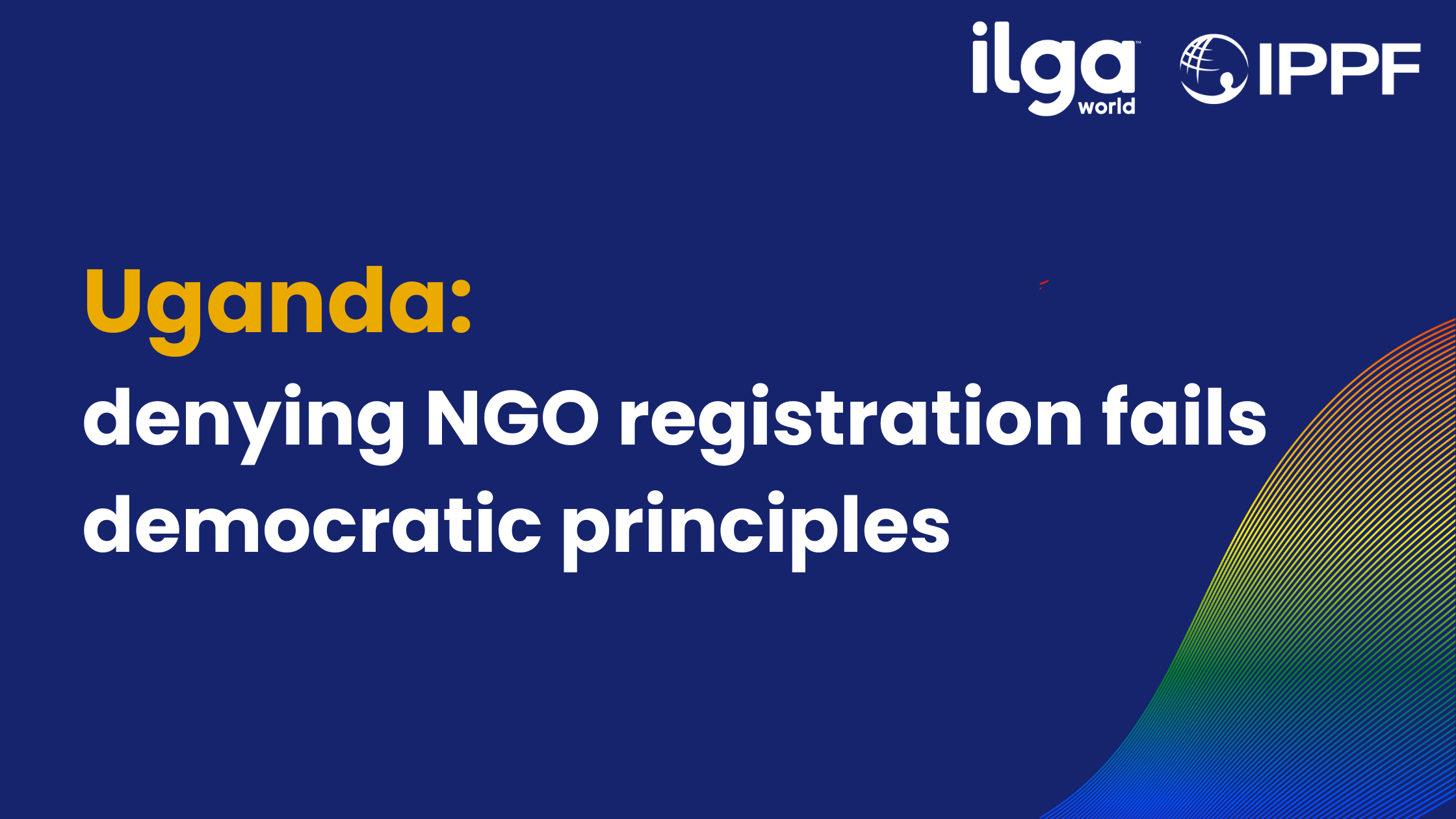
| 18 March 2024
Uganda: denying NGO registration fails democratic principles
Geneva/London, 15 March 2024 - The Ugandan Court of Appeal’s decision to deny Sexual Minorities Uganda (SMUG) legal registration fails the democratic principles enshrined in the country’s Constitution and should be reversed, ILGA World and The International Planned Parenthood Federation (IPPF) said today. Despite having worked to protect the human rights of people of diverse sexual orientations, gender identities and expressions for more than twenty years, Sexual Minorities Uganda has repeatedly been denied legal recognition: first in 2012 and then in 2018, when the High Court upheld the initial decision by the Uganda Registration Services Bureau. Six years later, in March 2024, the Court of Appeal shut down SMUG’s hope to register and be recognised as an independent legal entity under the law. “For civil society organisations working on sexual, gender and bodily diversity issues, registration allows them to serve more effectively those parts of societies that States fail to protect,” said ILGA World and IPPF. “Without this opportunity, they cannot conduct their activities formally or receive funding for their work. Ultimately, this decision restricts freedom of association and further pushes those who are already targeted by discriminatory laws to the margins of society.” “The Constitution of Uganda,” continue ILGA World and IPPF, “claims that ‘The State shall be based on democratic principles which empower and encourage the active participation of all citizens at all levels in their own governance.’ Ultimately, the extremely disappointing decision to reject SMUG’s registration goes in the entirely opposite direction. We are in solidarity with the organisation and join them in calling out this missed opportunity to protect better the rights of some of the most vulnerable populations in Ugandan society.” In Uganda, registration is banned for those organisations with goals that allegedly are “in contravention of the laws”. In January 2023, a report by the NGO Bureau detailed how the agency investigated and acted upon several organisations for promoting the rights of LGBTI people and recommended authorities take stricter measures against NGOs that "promote LGBTIQ activities" — including stepping up the criminalisation of activism. A few months later, the Anti-Homosexuality Act was signed into law, further cracking down also on organisations found guilty of “promoting homosexuality”. These actions against LGBTI human rights NGOs are part of a larger crackdown on Ugandan civil society. In November 2019, the Ugandan government shut down more than 12,000 organisations. Such actions have since continued, with as many as 54 organisations suspended in a single day in August 2021. “Across the world, State and non-state actors are mobilising voter bases by attacking our identities and freedoms: we see the same tactics at play here, too,” ILGA World and IPPF conclude. “At this critical time, politicians need to focus on the things that matter – a stable economy and vibrant communities — rather than attacking those who work to support vulnerable parts of societies. LGBTI people and cisgender heterosexual women and girls are marginalised and excluded by policies, legislation and narratives that strip away reproductive rights and criminalise sexuality and gender. But our communities stand united to defend and secure democratic and economic rights for all.” Notes to editors: ILGA World is a global federation of more than 2,000 organisations from 170 countries and territories, advocating for the human rights of people of diverse sexual orientations, gender identities and expressions, and sex characteristics worldwide. https://ilga.org The International Planned Parenthood Federation (IPPF) is a global healthcare provider and a leading advocate of sexual and reproductive health and rights for all. Led by a courageous and determined group of women, IPPF was founded in 1952, and today, it is a movement of 150 member associations and collaborative partners with a presence in over 146 countries. https://www.ippf.org/ Contacts for media enquiries: ILGA World: Daniele Paletta, communications manager, [email protected] IPPF: Alice Ackermann, communications adviser, [email protected]

| 02 March 2024
Ghana: IPPFAR is dismayed by the passing of the new anti-LGBTIQ+ rights bill in parliament
Nairobi, Kenya: 2 March 2024 – The International Planned Parenthood Federation Africa Region (IPPFAR) is deeply shocked and disturbed following Ghana’s parliament legislation passed on Wednesday 28 February which severely infringes on LGBTIQ+ rights and urges President Nana Akufo-Addo to not assent it. This regressive bill blatantly violates human rights and sexual and reproductive health, rights and justice, impacting not only the LGBTIQ+ community but all Ghanaians. The introduction of the new anti-LGBTIQ+ bill will undoubtedly result in a surge of attacks on real and perceived members of the LGBTIQ+ community in Ghana, further undermining their fundamental human rights and access to healthcare. The passage of the bill follows closely after Uganda's enactment of the Anti-Homosexuality Act, 2023, and amid discussions on a pending anti-LGBTIQ+ bill in Kenya. While Ghana's bill doesn't impose death sentences, it broadens its scope by criminalizing individuals who merely express LGBTIQ+ identity or support, suggesting the exclusion of a significant portion of society. This unacceptable bill imposes a prison sentence of up to three years for anyone convicted of identifying as LGBTIQ+ and imposes a maximum five-year jail term for forming or funding LGBTIQ+ rights groups. Violations imposed by the new bill include infringements on the rights to equality, dignity, privacy, freedom of speech, association, health, freedom from discrimination, arbitrary arrest, and the right to a fair trial. "We wholeheartedly condemn the introduction of this new abhorrent bill and urge President Nana Akufo-Addo to not sign it into law. It has no place in our legal systems or in our societies, and we stand in solidarity with those who continue to stand up for the human rights of all Ghanaians", stated Marie-Evelyne Petrus-Barry, IPPF Africa Regional Director. Local civil society organizations fear a significant increase in arrests, physical assaults against the LGBTIQ+ community, threats to the safety of civil society organizations, and a distressing rise in hate speech targeting LGBTIQ+ individuals and their allies since the bill was passed in parliament. "As the foremost provider of sexual and reproductive health (SRH) services in Africa, we are deeply concerned that the new anti-LGBTIQ+ bill will have a detrimental impact on our delivery of vital SRH services in the country due to the fear of individuals seeking healthcare, including HIV treatment, being targeted, persecuted, or discriminated against", added Marie-Evelyne Petrus-Barry. This devastating parliament bill is a major setback and is a reminder to remain aware that human rights violations of the LGBTIQ+ community persist across the continent. IPPFAR continues to be concerned about similar attempts to pass anti-LGBTIQ+ legislation in other African countries, as part of a growing effort to curtail SRHR and human rights more broadly. “We must continue to resist efforts to roll back the human rights of Africans and uphold the full enjoyment and protection of sexual and reproductive health, rights, and justice for all, regardless of their background, circumstances, sexual orientation, or gender identity”, said Marie-Evelyne Petrus-Barry. The vote by the parliament on Wednesday, along with the strong backing of certain groups for the bill, highlights the parliament's disregard for the human rights and social acceptance of LGBTIQ+ individuals. The anti-LGBTIQ+ rhetoric reflects a regression in democratic values, and it is crucial for President Nana Addo Dankwa Akufo-Addo to reject the bill. We call on all stakeholders to support local activists as they are often at the forefront in the effort for the realization of human rights for all, including SRHR. IPPFAR stands in unwavering solidarity with the LGBTIQ+ community, wherever they may be. END For further information or to request an interview, please contact: -Mahmoud GARGA, Lead Strategic Communication, Voice and Media, IPPF Africa Regional Office (IPPFAR) – email: [email protected] / Tel: +254 704 626 920 ABOUT IPPF AFRICA REGION (IPPFAR) The International Planned Parenthood Federation Africa Region (IPPFAR) is one of the leading sexual and reproductive health (SRH) service delivery organization in Africa, and a leading sexual and reproductive health and rights (SRHR) advocacy voice in the region. Headquartered in Nairobi, Kenya, the overarching goal of IPPFAR is to increase access to SRHR services to the most vulnerable youth, men and women in sub-Saharan Africa. Supported by thousands of volunteers, IPPFAR tackles the continent’s growing SRHR challenges through a network of Member Associations (MAs) in 40 countries. We do this by developing our MAs into efficient entities with the capacity to deliver and sustain high quality, youth focused and gender sensitive services. We work with Governments, the African Union, Regional Economic Commissions, the Pan-African Parliament, United Nations bodies among others to expand political and financial commitments to sexual and reproductive health and rights in Africa. Learn more about us on our website. Follow us on Facebook, Twitter, Instagram and You Tube.











